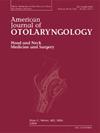A comparison of quality and readability of Artificial Intelligence chatbots in triage for head and neck cancer
IF 1.7
4区 医学
Q2 OTORHINOLARYNGOLOGY
引用次数: 0
Abstract
Objective
Head and neck cancers (HNCs) are a significant global health concern, contributing to substantial morbidity and mortality. AI-powered chatbots such as ChatGPT, Google Gemini, Microsoft Copilot, and Open Evidence are increasingly used by patients seeking health information. While these tools provide immediate access to medical content, concerns remain regarding their reliability, readability, and potential impact on patient outcomes.
Methods
Responses to 25 patient-like HNC symptom queries were assessed using four leading AI platforms: ChatGPT, Google Gemini, Microsoft Copilot, and Open Evidence. Responses were evaluated using modified DISCERN criteria for quality and SMOG scoring for readability, with ANOVA and post hoc analysis conducted afterward.
Results
Microsoft Copilot achieved the highest mean DISCERN score of 41.40 (95 % CI: 40.31 to 42.49) and the lowest mean SMOG reading levels of 12.56 (95 % CI: 11.82 to 13.31), outperforming ChatGPT, Google Gemini, and Open Evidence in overall quality and accessibility (p < .001). Open Evidence scored lowest in both quality averaging 30.52 (95 % CI: 27.52 to 33.52) and readability of 17.49 (95 % CI: 16.66 to 18.31), reflecting a graduate reading level.
Conclusion
Significant variability exists in the readability and quality of AI-generated responses to HNC-related queries, highlighting the need for platform-specific validation and oversight to ensure accurate, patient-centered communication.
Level of evidence
Our study is a cross-sectional analysis that evaluates chatbot responses using established grading tools. This aligns best with level 4 evidence.
人工智能聊天机器人在头颈癌分诊中的质量和可读性比较
目的头颈癌(HNCs)是一个重要的全球健康问题,导致大量发病率和死亡率。ChatGPT、谷歌Gemini、Microsoft Copilot和Open Evidence等人工智能聊天机器人越来越多地被患者用于寻求健康信息。虽然这些工具提供了对医疗内容的即时访问,但人们仍然担心它们的可靠性、可读性和对患者结果的潜在影响。方法采用ChatGPT、b谷歌Gemini、Microsoft Copilot和Open Evidence四种领先的人工智能平台,对25个类似患者的HNC症状查询进行评估。使用修改后的DISCERN质量标准和烟雾可读性评分对反馈进行评估,随后进行方差分析和事后分析。结果microsoft Copilot的平均识别率最高为41.40分(95% CI: 40.31 ~ 42.49),平均识别率最低为12.56分(95% CI: 11.82 ~ 13.31),在整体质量和可及性方面优于ChatGPT、谷歌Gemini和Open Evidence (p <;措施)。Open Evidence在质量(平均30.52 (95% CI: 27.52至33.52)和可读性(17.49 (95% CI: 16.66至18.31))方面得分最低,反映了研究生的阅读水平。结论:人工智能生成的hnc相关查询的回复的可读性和质量存在显著差异,强调需要针对特定平台进行验证和监督,以确保准确、以患者为中心的沟通。证据水平我们的研究是一个横断面分析,使用既定的评分工具来评估聊天机器人的反应。这与4级证据最吻合。
本文章由计算机程序翻译,如有差异,请以英文原文为准。
求助全文
约1分钟内获得全文
求助全文
来源期刊

American Journal of Otolaryngology
医学-耳鼻喉科学
CiteScore
4.40
自引率
4.00%
发文量
378
审稿时长
41 days
期刊介绍:
Be fully informed about developments in otology, neurotology, audiology, rhinology, allergy, laryngology, speech science, bronchoesophagology, facial plastic surgery, and head and neck surgery. Featured sections include original contributions, grand rounds, current reviews, case reports and socioeconomics.
 求助内容:
求助内容: 应助结果提醒方式:
应助结果提醒方式:


